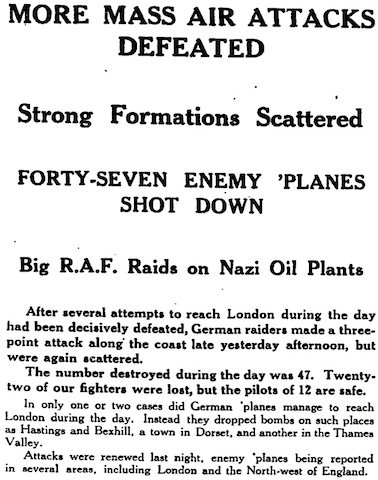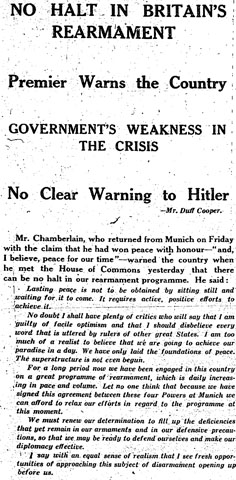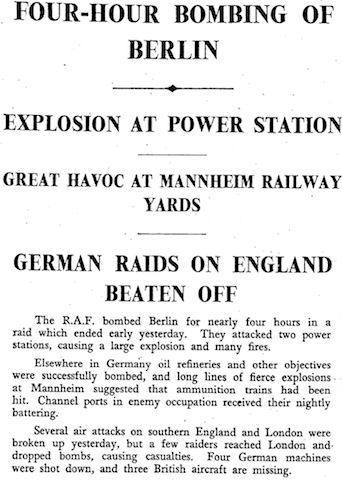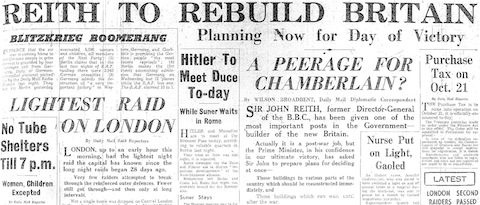
The Luftwaffe launched several large air raids in daylight hours yesterday. They had little success, and lost 47 aircraft. Fighter Command lost 22, but 12 of the pilots are safe (though the category ‘safe’ includes those alive but maimed, alive but burned, alive but psychologically scarred). Night attacks took place on London and the north-west of England; Bomber Command raided ‘war industries’ and aerodromes in Germany and occupied Europe. The Manchester Guardian reports that ‘Houses on the Kent coast were shaken by the explosions’ of bombs falling on Calais harbour and ‘gun emplacements near Cap Gris-Nez’ (5).

Despite yesterday’s activity, I’m starting to get a ‘summing up’ feeling from the press these days, as though a turning point has been reached. The above tallysheet of aircraft lost by both sides is admittedly something which the Guardian has run before.

But this ‘Record in brief since mass air raids started’ (6) — meaning 15 August: ’66 raiders down. Transport Mohamed Ali torpedoed, 120 missing’ (though it was actually sunk on 7 August) — is a new feature.
More significantly, there’s an article on page 5, entitled ‘First phase of the air war’. Citing ‘official opinion’, it informs us that Britain has
1. Inflicted upon the enemy in the air “Blitzkrieg” over England “very, very heavy loss in what has been a decisive and successful action on the part of the armed forces of this country.”
2. Caused a tremendous wastage of pilots in the Nazi air force at a stage when the personnel aspect is of vital importance in the final outcome of the war. We, in turn, have managed to conserve our air fighting strength, and therefore have a great potential of man-power to build up an enormous air force.
3. By no means exhausted the development of power of our fighters and bombers. Whereas the Germans appear to have exploited all the power potentialities of their craft without bringing about a decisive result, we are in a position to fit larger engines in our ‘planes, not to mention many other developments.
Admittedly ‘the question of stopping enemy bombers raiding London and other cities by night remains to be solved’. But ‘it was pointed out in authoritative Air Ministry quarters last night’ that ‘the prospects of developments “soon” are favourable’. The attacks on London are part of ‘the invasion plan’ (as opposed to reprisals for attacks on Berlin), ‘aimed at disrupting communications within and to and from the capital’, just like in Poland, the Low Countries and France. Says the authoritative Air Ministry person,
We have not only fought off the successive stages of Göring’s attack, but staved off invasion. It is a definite fact that the enemy has made plans for land attack which we have thrown into confusion.
Noel Monks said some similar things in the Daily Mail yesterday; I wonder if he was officially inspired as well.
There’s a precis on page 2 of an American reporter’s account of his recent visit to Germany. Writing in the New York newspaper P.M., Richard Boyer says that even at the peak of German military success at the end of June, the Germans were already weary of the war and worried that it would go on for a long time.
I found that the Nazis take it for granted that Germany will invade Russia in 1941, and also that high officials believe that war with the United states is inevitable.
In Berlin he ‘sat in bomb-proof shelters’ for ten days: ‘Never have I seen a people with less élan, with more real depression of spirit’. This gave the ‘mild bombings of Berlin an importance out of all proportion to the damage done’. Boyer describes
a dead listlessness which is spreading like a plague and infecting increasing numbers with defeatism. If the contagion is not halted, German itself, even in victory, may go the way of France.
This is interesting, for despite discrediting any notion that Berlin is receiving hammer blows (if only on military objectives), Boyer gives hope to anyone looking for signs that civilian morale in Germany is weaker, more brittle, than it is in Britain. If that’s true then the knock-out blow from the air is still on.
No letters in the Guardian about reprisals today, as usual. But Lord Davies, previously the foremost proponent of an international air force, writes in to support Lloyd George’s attack on the government’s refusal to build deep shelters (10). Davies certainly has a political agenda (not surprisingly, as a former long-serving Liberal MP himself):
This policy is another legacy of the Chamberlain regime, which obstinately refused to recognise the implications of air warfare.
and
If Mr. Lloyd George were Prime Minister to-day the job [of building deep shelters] would be done in a few months […]
But he also makes some more objective points. Anderson’s ‘surface shelters are only a palliative or makeshift’:
1. They do not give the sense of security essential to the wellbeing and efficiency of the community, especially at night.
2. They can be demolished by a direct hit
3. They were never intended for long spells of occupation during inclement weather, and will probably produce a crop of pneumonia, influenza, and other diseases during the coming winter.
It is not, Davies says, ‘a question of going to ground to save our skins in pandering to the safety complex’, but of making sure ‘the industrial communities’ get the rest they need ‘to cope with the strenuous work which our war effort demands’. Citing the pre-war Finsbury deep shelter plans (vetoed on the grounds of cost) as an example, he also asks ‘if Berlin equipped with deep shelters, then why not London?’ If the war is going to go on for years, then the sooner a start is made the better.
![]() This work is licensed under a Creative Commons Attribution-NonCommercial-NoDerivatives 4.0 International License.
Permissions beyond the scope of this license may be available at http://airminded.org/copyright/.
This work is licensed under a Creative Commons Attribution-NonCommercial-NoDerivatives 4.0 International License.
Permissions beyond the scope of this license may be available at http://airminded.org/copyright/.






Rather than ‘summing up’ it seems like the data they’re presenting could be an attempt to help clarify people’s memories. Now that the Battle has gone on for a while, there could be confusion about what happened when, and impressionistic errors about how things are progressing.
True, that’s possible. But why now, at this point? Refreshing people’s memories at this point seems to me like this was a natural place to pause and take stock. A turning point has been reached; let’s see how we got here and make sense of where we are going now.
The comments by Richard Boyer are interesting, though quickly checking his work and career suggests that he wasn’t totally committed to 20/20 reportage.
However, they do call to my mind something that I read (I think in Taylor’s Origins of the Second World War, but I don’t have my copy to hand to check) that (either over Czechoslovakia or Poland, again not sure which or exactly when) Hitler was struck by the German people’s lack of bellicosity. And in Sept 1940 there was a great deal less reason for war enthusiasm in Germany than in Sept 1939, as by then all the Versailles grievances had been settled.
[Incidentally, did others notice that today (2 Oct) Germany is making the very last payment on her Versailles debt?]
These chronologies suggest once again that no agreed narrative of the battle has yet emerged. July 10, which we know will become the official starting date of the Battle of Britain, is completely ignored; they choose August 11 as a watershed date, which AFAIK is no longer considered particularly important – Adlertag was August 13 – and while the big raids of September 7 are noted, they’re merely the intensification of an all-out attack on London which began in August. I can’t remember whether you’re taking the postblogging that far, but I wonder whether the official termination of the Battle, October 31, will prove to have any significance in the popular mind of the time? I doubt it already.
Neil:
Yes, though given Boyer’s Communist leanings (and probable party membership), it’s interesting to see him talking down the Germans and playing up the likelihood of invading the Soviet Union — the Molotov-Ribbentrop Pact still being in effect, this wasn’t the party line at the time.
I did see about the Versailles debt, though I’ve also heard that it’s technically not Versailles debt but the buying out of Weimar bonds raised to pay the Versailles debt. Or something.
Alan:
I won’t be going that long, just a few more days — Mainly because I’m not getting any other work done! Though I plan to do a bit more later in the year.
But I suspect you’re right; 31 October will be just another day. Of course there’s nothing wrong with coming along after the event and constructing a chronology which has different priorities to those living at the time. Just that we ought to be aware of this when we use them and not assume they are the only ways to frame the events. The Air Ministry chronology is useful from an operational/strategic view, not so much for looking at ‘the people’s war’.
Pingback: Airminded · Friday, 4 October 1940
Pingback: Airminded · Post-blogging 1940: preliminary thoughts and conclusions